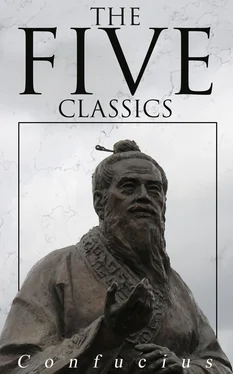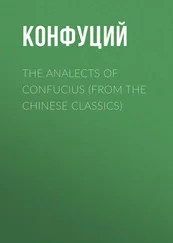The Khang-hsî editors find in the concluding symbolism an incentive to humility:--'The duke, leaving birds on the wing, is content to use his arrows against those in a cave!'
Line 6 is weak, and is at the top of the trigram of movement. He is possessed by the idea of the hexagram in an extreme degree, and is incapable of keeping himself under restraint.
Table of Contents

K î Ȝî intimates progress and success in small matters. There will be advantage in being firm and correct. There has been good fortune in the beginning; there may be disorder in the end.
1. The first line, undivided, (shows its subject as a driver) who drags back his wheel, (or as a fox) which has wet his tail. There will be no error.
2. The second line, divided, (shows its subject as) a wife who has lost her (carriage-)screen. There is no occasion to go in pursuit of it. In seven days she will find it.
3. The third line, undivided, (suggests the case of) Kâo Ȝung, who attacked the Demon region, but was three years in subduing it. Small men should not be employed (in such enterprises).
4. The fourth line, divided, shows its subject with rags provided against any leak (in his boat), and on his guard all day long.
5. The fifth line, undivided, shows its subject (as) the neighbour in the east who slaughters an ox (for his sacrifice); but this is not equal to the (small) spring sacrifice of the neighbour in the west, whose sincerity receives the blessing.
6. The topmost line, divided, shows its subject with (even) his head immersed. The position is perilous.
63.The character called K î is used as a symbol of being past or completed. Ȝî denotes primarily crossing a stream, and has the secondary meaning of helping and completing. The two characters, combined, will express the successful accomplishment of whatever the writer has in his mind. In dealing with this lineal figure, king Wăn was thinking of the condition of the kingdom, at length at rest and quiet. The vessel of the state has been brought safely across the great and dangerous stream. The distresses of the kingdom have been relieved, and its disorders have been repressed. Does anything remain to be done still? Yes, in small things. The new government has to be consolidated. Its ruler must, without noise or clamour, go on to perfect what has been wrought, with firmness and correctness, and ever keeping in mind the instability of all human affairs. That every line of the hexagram is in its correct place, and has its proper correlate is also supposed to harmonize with the intimation of progress and success.
Line 1, the first of the hexagram, represents the time immediately after the successful achievement of the enterprise it denotes;--the time for resting and being quiet. For a season, at least, all movement should be hushed. Hence we have the symbolism of a driver trying to stop his carriage, and a fox who has wet his tail, and will not tempt the stream again.
Line 2 is weak, and in its proper place. It also has the strong correlate 5; and might be expected to be forward to act. But it occupies its correct and central place, and suggests the symbol of a lady whose carriage has lost its screen. She will not advance p. 207 further so soon after success has been achieved; but keep herself hidden and retired. Let her not try to find the screen. When it is said that she will find this 'after seven days,' the meaning seems to be simply this, that the period of K î Ȝî will then have been exhausted, the six lines having been gone through, and a new period, when action will be proper, shall have commenced.
The strong line 3, at the top of the lower trigram, suggests for its subject one undertaking a vigorous enterprise. The writer thinks of K âo Ȝung, the sacrificial title of Wû Ting, one of the ablest sovereigns of the Shang dynasty (B. C. 1364-1324), who undertook an expedition against the barbarous hordes of the cold and bleak regions north of the Middle States. He is mentioned again under the next hexagram. He appears also in the Shû, IV, ix, and in the Shih, IV, iii, ode 5. His enterprise may have been good, and successful, but it was tedious, and the paragraph concludes with a caution.
Line 4 is weak, and has advanced into the trigram. for water. Its subject will be cautious, and prepare for evil, as in the symbolism, suggested probably by the nature of the trigram.
'The neighbour in the East' is the subject of line 5, and 'the neighbour in the West' is the subject of the correlate 2, the former quarter being yang and the latter yin. Line 5 is strong, and 2 is weak; but weakness is more likely to be patient and cautious than strength. They are compared to two men sacrificing. The one presents valuable offerings; the other very poor ones. But the p. 208 second excels in sincerity, and his small offering is the more acceptable.
The topmost line is weak, and on the outmost edge of Khân, the trigram, of peril. His action is violent and perilous, like that one attempting to cross a ford, and being plunged overhead into the water.
Table of Contents

Wei Ȝî intimates progress and success (in the circumstances which it implies). (We see) a young fox that has nearly crossed (the stream), when its tail gets immersed. There will be no advantage in any way.
1. The first line, divided, shows its subject (like a fox) whose tail gets immersed. There will be occasion for regret.
2. The second line, undivided, shows its subject dragging back his (carriage-) wheel. With firmness and correctness there will be good fortune.
3. The third line, divided, shows its subject, with (the state of things) not yet remedied, advancing on; which will lead to evil. But there will be advantage in (trying to) cross the great stream.
4. The fourth line, undivided, shows its subject by firm correctness obtaining good fortune, so that all occasion for repentance disappears. Let him stir himself up, as if he were invading the Demon region, where for three years rewards will come to him (and his troops) from the great kingdom.
5. The fifth line, divided, shows its subject by firm correctness obtaining good fortune, and having no occasion for repentance. (We see in him) the brightness of a superior man, and the possession of sincerity. There will be good fortune.
6. The topmost line, undivided, shows its subject full of confidence and therefore feasting (quietly). There will be no error. (If he) cherish this confidence, till he (is like the fox who) gets his head immersed, it will fail of what is right.
64.p. 208 Wei Ȝî is the reverse of K î Ȝî. The name tells us that the successful accomplishment of whatever the writer had in his mind had not yet been realised. The vessel of the state has not been brought across the great and dangerous stream. Some have wished that the Yî might have concluded with K î Ȝî, and the last hexagram have left us with the picture of human affairs all brought to good order. But this would not have been in harmony with the p. 209 idea of the Yî, as the book of change. Again and again it has been pointed out that we find in it no idea of a perfect and abiding state. just as the seasons of the year change and pursue an ever-recurring round, so is it with the phases of society. The reign of order has been, and has terminated; and this hexagram calls us to see the struggle for its realisation recommenced. It treats of how those engaged in that struggle should conduct themselves with a view to secure the happy consummation.
Читать дальше














